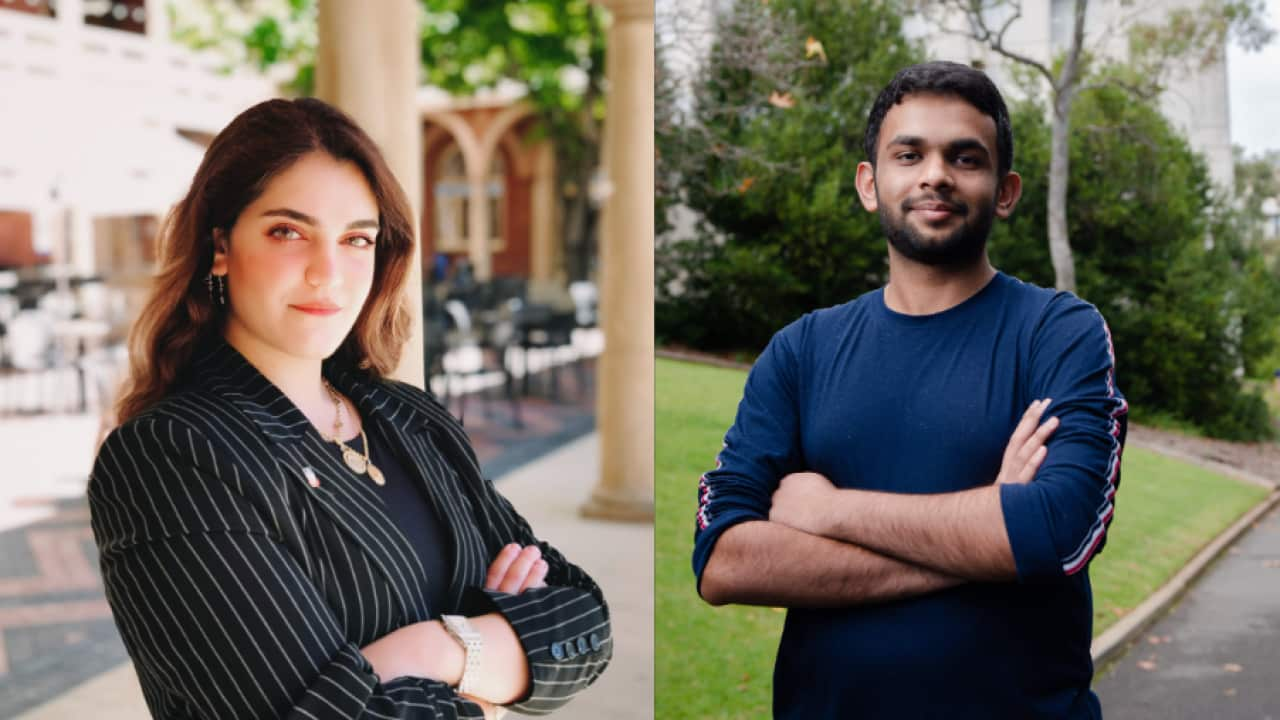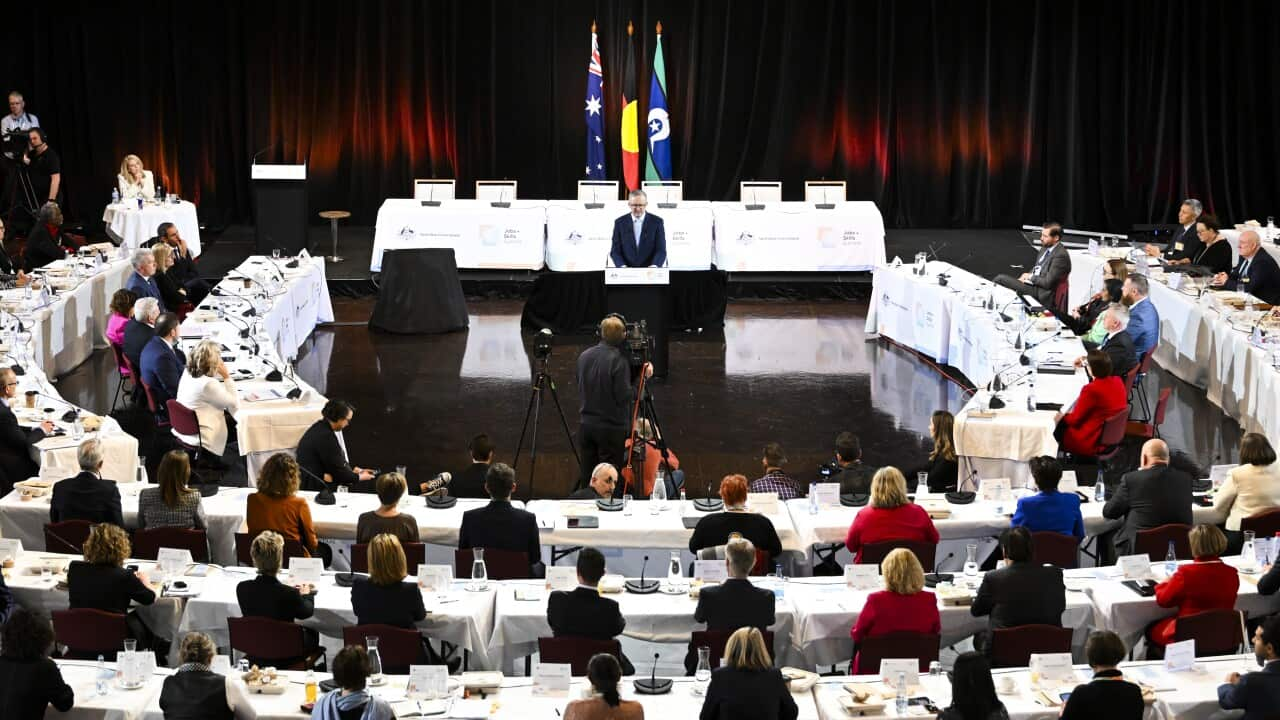Key Points
- Some bachelor's degree holders will be able to work for four years, up from two, after graduating
- The government will announce in October which degrees are included
International students have welcomed the news that Australia wants to keep them here for longer after they graduate, saying the move will not only help to attract more students to Australian universities but will also help them to secure graduate roles.
Under new rules proposed at the , select bachelor's degree holders will be able to work for four years, up from two, after graduating, while master's students will be able to work for five years, up from three, and PhD students will be able to work for six years, up from four.
The government will announce in October which degrees will be included, with nursing, engineering and IT students to be given priority, a spokesperson for Home Affairs Minister Clare O'Neil told SBS News.
"They're the graduates that the government believes Australia needs," the spokesperson said, "and they can go straight into a sector where there is a shortage of high skilled workers. Australia needs to better use the amazing resource of international students."
While this applies to current students set to graduate in this financial year, the rule is expected to be extended over coming years.
Janageeth Logeswaran from Sri Lanka will graduate from Flinders University in Adelaide in 2024 with a bachelors degree in computer science specialising in artificial intelligence.
He says plans by the government to keep international students in Australia for longer after they graduate is "great news".
"I'm pretty sure my friends and everyone I know here in Australia who's studying as international students will love the news. I am just grateful, really grateful that the Australian government has done that."
Mr Janageeth arrived in Australia last December after studying for his first year online. He says "it's amazing" to finally be at the university in person.

Janageeth Logeswaran says he would like to set up his own artificial intelligence company in Australia after he graduates. Source: SBS News / Flinders University
There are various work, business and investment permanent residency visas available, with workers having to prove they have skills that Australia values or find an Australian employer to sponsor them.
The federal government committed at the summit to , with the extra 35,000 designed to attract thousands more nurses and technology workers, among others, to directly meet pressing skills shortages.
"International students are bringing a lot of money to Australia. They are here, and they've been educated in the Australian education system," Mr Janageeth said.
"They have a lot to contribute to the economy … When they work here, it helps with the skills shortage, which also takes the pressure off the Australian economy."
He says many international students have chosen to study in Canada because it's easier to get permanent residency after graduating.
"If this process becomes a bit easier for international students to get their permanent residency here in Australia, I'm sure that a lot of talented students would not hesitate to choose Australia."
Federal Education Minister Jason Clare told last week's Higher Education Summit that just 16 per cent of international students stay on to work after their studies, compared to 27 per cent in Canada.
Yeganeh Soltanpour, from Iran and the United Arab Emirates, is studying an MBA at the University of Adelaide. She says she chose to study here because of "how exceptional the universities were" and because Adelaide was deemed a very livable city.
"I wanted to study somewhere that had a large variety of cultures and sights I could see to ensure I can not only get quality education from an exceptional university but also a lived experience."
Ms Yeganeh says rules allowing graduates to work for longer in Australia will allow them to better compete in Australia's job market.
"The easing of these rules means a lot to us as students.
"Finding graduate roles has become more difficult than ever because as soon as employers realise we’re international students, they almost always see us as temporary and don’t want to spend resources training a candidate they don’t know is going to be able to stay or not.
"Easing these rules allows students to get a chance to get their foot in the door for an interview."

YeganehSoltanpour says rules allowing graduates to work for longer in Australia will allow them to better compete in Australia's job market. Source: SBS News / Supplied
"It’s a benefit to not just the students, but the Australian economy — bringing a diverse set of cultures and skills into their workforce can only ever be an opportunity for growth."
Ms O'Neil has said a working group will be established to advise the Ministers for Home Affairs and Education on the development of the new rules and other relevant issues, with the group to report to ministers by 28 October.
Members of the working group will include representatives from the Council of International Education, the National Tertiary Education Union, Universities Australia, and the Departments of Home Affairs and Education.
Oscar Zi Shao Ong, National President of Council of International Students Australia (CISA), says the extensions allowing graduates to work in Australia for longer will certainly provide certainty to international students during their studies and will help them find work.
"International students that are trained to Australian standards provide a unique perspective and diversity to the existing workforce," he told SBS News.
But he says "fundamental misconceptions" around their value also needed to be addressed, especially given onshore international students had "assisted Australia through COVID", working in cafes, aged care homes and volunteer organisations.
"International students have always found it tough to find jobs due to misconceptions about their working rights and the perception they are not staying in Australia for longer than two years," he said.
"The fact that international students have been filling skills shortages in Australia [during COVID] and also the immense value they provide Australia, not just economic but social, needs to be admitted."
In addition to allowing international students to work for longer once they graduate, the federal government is also extending the relaxation on the number of hours students and training visa holders can work until 30 June 2023, with stakeholders to advise on caps from there on.
Mr Zi Shao Ong says CISA has always welcomed more working hours for international students because this reduces the chances of them being exploited in illegal working conditions such as wage theft.
"The caveat is this relaxation might have the effect of international students overworking themselves," he said.
"We note there needs to be a balancing act to ensure international students are able to work more in industries relevant to their studies and also able to earn sufficient to support their studies; hence there needs to be a rethink of international student working rights rather than reverting back to the old settings after June 30 2023."
Sally Wheeler, Professor of Law and Deputy Vice Chancellor for International and Corporate at the Australian National University, adds the move to keep international students in Australia for longer is "a definite step in the right direction".
But she says that Australia needs to encourage employers to employ international students instead of being nervous about training them, knowing they soon have to leave.
"Employers need to be socialised into the idea of being able to offer work integrated learning packages and internships to international students as they progress through their degrees," she told SBS News.
"What we see is a huge narrowing: 400,000-odd students coming into Australia on student visas, around 80,000 staying for the current study-to-work package, and then 16,000 going on to PR. If we could change the dial on those numbers, it would be great.
"I think it's certainly the case that students who would like to stay see themselves going home, or they see themselves never staying here.
"So the whole time they're studying here, they are looking for employment opportunities elsewhere in the world, their home country, but also other countries where there is a very good micro skilled migrant visa package."












